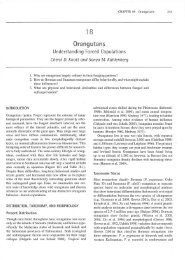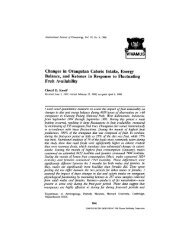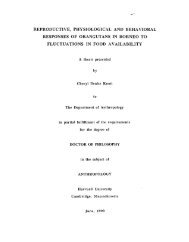Saving Gunung Palung: A Rainforest Marriage - Cheryl Knott
Saving Gunung Palung: A Rainforest Marriage - Cheryl Knott
Saving Gunung Palung: A Rainforest Marriage - Cheryl Knott
- No tags were found...
You also want an ePaper? Increase the reach of your titles
YUMPU automatically turns print PDFs into web optimized ePapers that Google loves.
on developmentCompleting the Translation:The GSAS EnglishLanguage ProgramBy Marnie HammarWhen was the last time you debated themerits of idealism versus materialism?In a foreign language? The 14 students in KarlReynolds’s class in the English LanguageProgram (ELP) did just that.Every August since 2000, a select numberof international students participate in theEnglish Language Program before beginningtheir graduate work. Designed largely for studentswith little prior exposure to the UnitedStates, this four-week program combines culturalacclimation with language skills.For 2003, the program welcomed 48 studentsfrom 14 countries and and 19 academicdepartments.They were immersed in rigorousstudy for most of August, with class andother activities six hours a day, five and a halfdays a week, and homework in the eveningsand on weekends.“This program is really intensive,” saysReynolds, instructor for the Harvard Institutefor English Language Programs and one offour ELP instructors. “This isn’t summercamp—it’s a glimpse into the lives they willlead in September.”FOCUSThe program comprises four main areas: writing,reading, speaking, and listening. Studentsread assignments, write essays, critique oneanother’s writing, and lead or participate indiscussion groups. They also give formal presentationsin groups and individually.On the day the class debated idealism andmaterialism, a student led her classmates in arousing discussion of William James. At theconclusion, Reynolds critiqued the leader, theclass, and their interaction. He also offeredspeaking tips, emphasizing correct pronunciationof words that arose in the discussion andexplaining some of the idiosyncrasies of theEnglish language.“The ELP class [is] a safe place. Studentsaren’t self-conscious about being correctedbecause they are all in the same situation.They learn to trust each other very quickly,”says Reynolds.Rose LincolnTalking things over: ELP Students (from left) SongChen, Geng Li, and instructor Anna Feliksik listento what fellow student Rina Anno (far right) hasto say.Says Dadi Darmani, an ELP participant fromIndonesia:“Not only is this program essentialfor improving my language proficiency, it alsogives me a good glimpse of Harvard andCambridge. I think it is very significant in providingme a smooth transition to my academiccareer.”To acquaint ELP students with theAmerican teaching style, Harvard facultyoccasionally give guest lectures. “TheAmerican lecture style is interactive, withmore questioning, debate, and discussion than[that of] many other countries,” saysReynolds.“This can be uncomfortable for studentswho might be accustomed only to lectures.”Field trips to destinations such as theMuseum of Science help acclimate students toAmerican culture beyond Harvard. The finalweek of the program is spent at the DerekBok Center for Teaching and Learning, wherestudents give practice lectures and receivecritiques from classmates and guest students.At the end of the four weeks, Reynoldssays he sees a dramatic change in the program’sparticipants. “They come so far,” hesays.“They have so much more confidence intheir speaking and writing abilities. They areready to focus on what they came here for.”Students also build a community that lastswell into their academic careers, Reynoldsadds.“They leave the program knowing thatthey can go to their fellow participants forsupport in the struggles they will undoubtedlyencounter [during] their first year,” hesays.“It’s a lasting community.”SUPPORTThe Graduate School funds all aspects ofthe English Language Program, from tuition,books, and supplies, to housing and meals,and a major portion of that funding isalumni contributions to the GraduateSchool Fund (GSAS’s annual giving fund).The continued success of ELP dependson the ability of GSAS to fund these fourweeks for every eligible student. TheseFund contributions are essential to thefuture of this most important program.“All new students, whether they areinternational or not, go through a period ofadjustment,” says Reynolds.“It’s even more challenging for internationalstudents because they are trying tosimultaneously understand a new cultureand new concepts in their classes.The ELPhelps them to feel comfortable inCambridge and in the classroom beforethey start getting graded. It’s a good headstart.”To learn more about supporting the EnglishLanguage Program or the Graduate SchoolFund, please contact Jennifer Campoli at1-800-VERITAS or at jennifer_campoli@harvard.edu.Marnie Hammar is associate director of communications at theUniversity Development Office.Colloquy 17 Fall 2003





